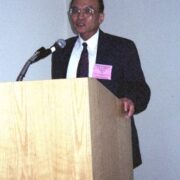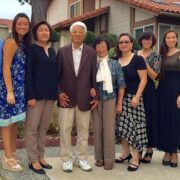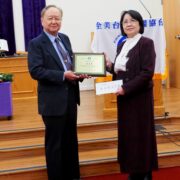Becoming an American
Author:Sue Shwu Lih Lin (林淑麗)
A Guest Opinion Essay – Cranbury Press, Dec, 13, 2002
“Beamer memorial planned by Lions for Township Park,” the headline of the Cranbury Press (September 28, 2001) read. “Todd Beamer may have been a resident of Cranbury for only the past year, but his actions on Sept. 11 may have made him a hero that won’t soon be forgotten by residents.”
I was aware that a Cranbury resident lost his life during the 9/11 attacks, but not the detail. Not until four months later, when I referred to the newspaper for an unrelated project. I was so involved in my activities that this significant event in the community escaped my notice.
Mr. Beamer was aboard United Airline Flight 93, when it was hijacked and clashed near Pittsburgh, Pennsylvania on September 11, 2001. He is believed to have been one of several passengers who try to overtake the terrorists. A GTE operator heard his last words, “Let’s roll” just before several passengers rushed to the cockpit. Experts believed that the terrorists were targeting the plane at White House or Capitol Hill.
In honor of his heroism, the Congress has approved a bill that designates Cranbury post office in his honor. Congressman Rush Holt, who spoke at the dedication ceremony on May 4, 2002, remarked, “Every youngster who walks by here wondering to himself, ‘Will I ever amount to anything?’ or even an adult wondering, ‘Does America have the right stuff?’ They will be reminded that in America, there are people like Todd Beamer.”
About a thousand people attended the ceremony in front of the classical looking, red-bricked post office. I, too, stood among them in tribute to Mr. Beamer and other passengers. I did so with perhaps a sense of guilt.
When I moved to Cranbury in the summer of 1997, I was still recovering from a car jacking in October ’96, a cancer scare and the loss of my father, both in 1994. Since settled here, my life has been filled with blessings. The 9/11 incidents became the next big awakening for me. This time, the image of an infallible nation melted down as a stunned world watched on. My belated awareness of a neighbor’s heroism in this event made me wonder, “Am I worthy of being an American?”
A few writers and journalists reflected on the event of September 11 in a New Yorker feature article “The Talk of the Town” (September 24, 2001) Dennis Johnson, for example, shared his experiences of meeting people in the world’s troubled spots: To many of them, Americans are either “wondrously celebrated” or “being hated like a bad god.”
These contradictory views may have some justification, based on the circumstances, including media propaganda, under which people construct their image of Americans.
As for myself, I am always fascinated by the multifaceted drama of the American dreams, as well as the competence and humor of the people.
I have lived in America since 1974; first as a graduate student, then as a scientist at work and a parent in the education system. The fact that one can rely on people here to conduct daily life according to rules and regulations is most helpful and refreshing.
I did not socialize much with Americans until 1999, two years after I moved to Cranbury, when I became a member of the Women’s Club. To know them in leisurely settings has been a rewarding experience. Not only have I come to appreciate the commonality of all people as they reveal family problems, pains of the past, etc. I also gained insight of myself as an immigrant.
“Keep us, O God from pettiness; let us be large in thought, in word, in deed,…” the general meeting of Cranbury Women’s Club always start with recital of “A Collect for Club Women” These women are serious about what they preach. I once attended a pre-Christmas lunch with the art group, surrounded by complete strangers. And yet they took me in as if they knew me. I feel quite at home among them.
Still, there are times when I am a bit uneasy. I remember one day some members were discussing the play, “A man for all seasons “, in Mrs. Wagner’s family room. Sir Thomas More, author of “Utopia”, one of the Renaissance masterpieces, was beheaded for his refusal to compromise with the king’s religious stand. His various contributions to the society and the welfare of the king did not matter. The tragic outcome set these ladies’ teeth on edge. As my friends engaged in heated discussion, I fell in silence.
There are similar, and perhaps more horrible stories in the Orient. Should I share my perspective? Could I make it as compelling? I grabbed an opportunity to inject my thoughts: “In the East, ——–” Now they all turned towards me, trying hard to understand, but were lost and uncomfortable. The palace intrigues, the mind of a Confucius scholar, the logic of the outcome: these vivid images went to pieces; the story paled in comparison to what was customary.
The world knows the Bible, the Latin classics, the philosophers from Socrates to Sartre, and the English language. History has brought us here. I shall not complain. If I had a slight sense of resentment for Western dominance, subsequent events would soon reorient my perception.
In the summer of 2001, while I served as the president of Windsor Area Taiwanese American Association, the board of directors approved a book donation project. These books are a collection of translated fiction by most celebrated Taiwanese writers. By making them available to the public, we hope Americans, the second generation Taiwanese Americans in particular, will have an opportunity to understand the culture and history of Taiwan, through the myriad of facets these pieces depict.
During this time, I was deeply involved in coordinating a seminar and a reception related to the book donation project. Then came the 9/11 incident. At this juncture, we hesitated about continuing the project. But abandoning it seemed equally unconvincing. Thus, we decided to go ahead.
In the course of promoting the project, I came to appreciate my neighbors even more. Mr. Saccenti, the news editor of Cranbury Press, sent a reporter to interview me regarding the book donation. Mrs. Wood, the leader of the drama and literature group, helped in generating interest in the books. As a result, the Cranbury Women’s Association held a fiction reading session and showed a video of Taiwan at the general meeting in January 2002. Mr. Zogott, our librarian, lent his support and expertise. Although it was a cold, snowy day, more than thirty people showed up. And they loved it.
Things turned out well and I wanted to write about it: my story included discussing “A Man for all Seasons” with friends, expert opinions on the matter of cross-cultural issues and the book donation seminar. It covered the reading session held by the Women’s Club and follow-up interviews with some participants. But something was missing. There was no tension.
It was when I searched all over for ideas, and finally glancing at the Press’s coverage of the book donation (Sept. 28, 2001), I noticed another headline, “Beamer Memorial Planned by Lions for Township Park.” and learned about the circumstances of Todd Beamer’s death. I was so involved in my own world, and so self-serving.
Hence, in a piece for two Taiwanese American newspapers, I reflected on the situation. I wanted people who made petty remarks to be aware: That by sheer coincidence, my small undertaking appeared in the same page of the Cranbury Press as the Lion’s plan on a memorial for Mr. Beamer, another resident in Cranbury.
Why would Americans need a dose of cultural diversity considering the origin of their grief? But these villagers went on to embrace its newcomers anyway, foreign or native. They offered encouragement to the living for small endeavors while honoring the dead for heroism.
My story also found its way to the Island of Taiwan: On August 25, 2002, Liberty Times, Taiwan’s most widely circulated newspaper, reprinted it in a Sunday literary edition. Meanwhile, I have heard very enthusiastic comments on numerous occasions.
This may puzzle my American friends. After all, it is only a few translated books for the local library, an hour of social gathering and a taste of exotic culture for them. But it is something noteworthy for people of Taiwan origin. Because the building block of literature is language. To transcend language barrier is a significant leap forward. The Taiwanese cannot but treasure this bit of international limelight. The islanders, colonized and repressed for nearly a century, have struggled in establishing self-identity. Even now, Taiwan has yet to be admitted to the United Nations.
It is perhaps ironic that their appreciation comes at a time when the world’s strongest democracy is under attack. How fragile is our civilization. And how undeserving for a nation that led the world out of the destruction of WWII!
Nowadays, I jog occasionally from my community to the nearby Township Park, where the Beamer’s memorial is located. His next-door neighbor has uprooted a tree from home and replanted it here. Under the tree is a large stone with a plaque, the last sentence on which reads, “This memorial celebrates the faith and heroism of Todd Beamer-husband, father, son, brother, friend, civilian-An American.” The word, “An American,” now carries a special meaning for me. (adopted from the newspaper copy with minor editing)
源自 林淑麗






